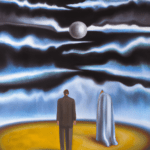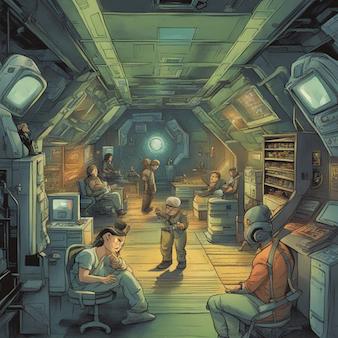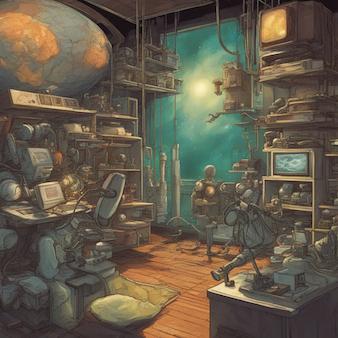Science fiction is a genre that has been around for centuries, and it continues to captivate readers with its imaginative stories that are often set in a world beyond our own. Whether it is exploring new worlds, imagining new technologies, or speculating on the future of humanity, science fiction novels have the power to transport readers to new and exciting places. But what elements of writing does it take to write a compelling science fiction novel? In this article, we will discuss the 10 essential elements that every science fiction novel should have.
Elements of Writing Science Fiction

- A Unique Concept: One of the most important elements of a compelling science fiction novel is a unique concept. The best science fiction novels are those that introduce readers to a new and exciting idea or world. Whether it is an alien planet, time travel, or an alternative universe, the concept should be something that has not been explored before.
- World Building: Science fiction novels often take place in worlds that are vastly different from our own. To create a believable and engaging world, an author must focus on world building. This involves creating a detailed and cohesive world, complete with its own history, geography, culture, and technology. By doing this, the author can immerse the reader in the world and make them feel like they are a part of it.
- A Strong Plot: A strong plot is crucial to any novel, and science fiction is no exception. The plot should be well thought out and well executed, with a clear beginning, middle, and end. It should be engaging and keep the reader hooked throughout the entire story.
- Complex Characters: In addition to a strong plot, science fiction novels should also have complex and well-developed characters. The characters should have their own motivations, strengths, weaknesses, and flaws. They should be relatable and easy to connect with, and they should grow and evolve throughout the story.
- Scientific Accuracy: While science fiction novels often deal with fantastical ideas and concepts, they should still be scientifically accurate. This means that the author should have a basic understanding of science and technology, and the concepts in the novel should be grounded in reality. This will make the story more believable and help readers to connect with the characters and the world.
- Imaginative Technology: Technology often plays a central role in science fiction novels, and it is important that the technology in the novel is imaginative and unique. Whether it is a new type of spaceship, a futuristic weapon, or a revolutionary medical device, the technology should be something that readers have not seen before. This will help to create a sense of wonder and excitement in the reader.
- Exploration of Themes: Science fiction novels often explore complex themes, such as the nature of humanity, the consequences of technology, or the meaning of existence. These themes should be woven into the story in a way that is subtle and thought-provoking. They should make the reader think and reflect on their own beliefs and values.
- Action and Suspense: Science fiction novels are often full of action and suspense, and it is important that the author is able to create tension and excitement in the reader. This can be achieved through well-crafted action scenes, cliffhangers, and unexpected plot twists.
- A Sense of Wonder: One of the defining features of science fiction is a sense of wonder. Science fiction novels should make the reader feel like anything is possible, and that the universe is full of endless possibilities. This can be achieved through vivid descriptions of new worlds and technologies, and by creating a sense of awe and amazement in the reader.
- A Message: Finally, science fiction novels should have a message or moral. This can be a subtle or overt message, but it should be something that the reader can take away from the story. Whether it is a warning about the dangers of unchecked technological progress or a reflection on the importance of empathy and compassion, the message should be thought-provoking and impactful.
Writing a compelling science fiction novel requires careful attention to a variety of elements. A unique concept, world building, a strong plot, complex characters, scientific accuracy, imaginative technology, exploration of themes, action and suspense, a sense of wonder, and a message are all essential components that can make a science fiction novel stand out. By incorporating these elements into their writing, authors can create stories that captivate and inspire readers, taking them on thrilling journeys to new worlds and exploring complex ideas along the way.
Keywords: science fiction, novel, concept, world building, plot, characters, scientific accuracy, technology, themes, action, wonder, message, elements of writing, elements of writing science fiction, elements of writing a book, elements of writing fiction, elements of writing science fiction books, elements of writing a bestseller, elements of writing science fiction novels, elements of writing tips
Check out our Novel Writing Workbooks
Check out Little Tree Food Forest for articles on food forests and homesteading.
Check out FoodieScapes for articles on growing, fermenting and preserving food
Check out StoryScapes.World for articles on writing.
Subscribe to our newsletter to get information delivered to your inbox on how to write a book, outlining your novel, keeping journals, marketing your novel, self-publishing, writing poetry and more.










